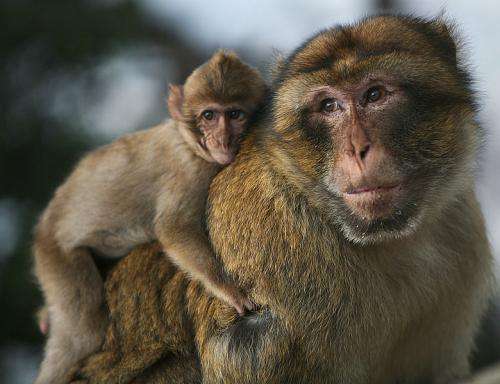December 1, 2015 report
Study finds 'rudimentary' empathy in macaques

(Phys.org)—A pair of researchers with Centre National de la Recherche Scientifique and Université Lyon, in France has conducted a study that has shown that macaques have at least some degree of empathy towards their fellow cage mates. In their paper published in Proceedings of the National Academy of Sciences, Sebastien Ballesta and Jean-René Duhamela describe the experiments they carried out and why they believe the results suggest that macaques are aware of the emotional state of other macaques and express empathy towards them under certain circumstances.
The experiments carried out by the duo consisted of placing pairs of captive macaques opposite one another and then allowing them to take turns picking an icon on a screen that offered the other either a reward or a punishment. Rewards were juice sips, while punishment came in the form of puffs of air into the eyes. The researchers also used eye-tracking devices to monitor the gaze and blink rate of the monkeys as they performed their tasks—useful signals for signs of social engagement.
The researchers found that most of the 14 pairs of monkeys used in the experiment were disinclined to cause another to be punished but gave rewards freely. They also recorded eight instances of positive social behavior as part of rewarding a partner, four indifferent behaviors and two types of behavior that were classified as antisocial. They noted also a link between social gazing and granting of a reward, which suggested the monkeys were aware of what they were doing—they also reported witnessing eye blinking that they deemed indicative of empathy when a punishment was chosen.
The researchers also found that those monkeys that were most likely to administer rewards to others also tended to blink more in anticipation of an air puff to another monkey's eyes, and blinked more afterwards as well. They suggest their experiments taken as a whole offer evidence of the monkeys taking account of the behavior of other monkeys and modifying their behavior as a result, going so far as to claim that they have shown that the monkeys are aware in some respect of the wellbeing of their peers, and respond in ways they deem appropriate.
More information: Sebastien Ballesta et al. Rudimentary empathy in macaques' social decision-making, Proceedings of the National Academy of Sciences (2015). DOI: 10.1073/pnas.1504454112
Abstract
Primates live in highly social environments, where prosocial behaviors promote social bonds and cohesion and contribute to group members' fitness. Despite a growing interest in the biological basis of nonhuman primates' social interactions, their underlying motivations remain a matter of debate. We report that macaque monkeys take into account the welfare of their peers when making behavioral choices bringing about pleasant or unpleasant outcomes to a monkey partner. Two macaques took turns in making decisions that could impact their own welfare or their partner's. Most monkeys were inclined to refrain from delivering a mildly aversive airpuff and to grant juice rewards to their partner. Choice consistency between these two types of outcome suggests that monkeys display coherent motivations in different social interactions. Furthermore, spontaneous affilitative group interactions in the home environment were mostly consistent with the measured social decisions, thus emphasizing the impact of preexisting social bonds on decision-making. Interestingly, unique behavioral markers predicted these decisions: benevolence was associated with enhanced mutual gaze and empathic eye blinking, whereas indifference or malevolence was associated with lower or suppressed such responses. Together our results suggest that prosocial decision-making is sustained by an intrinsic motivation for social affiliation and controlled through positive and negative vicarious reinforcements.
Journal information: Proceedings of the National Academy of Sciences
© 2015 Phys.org

















